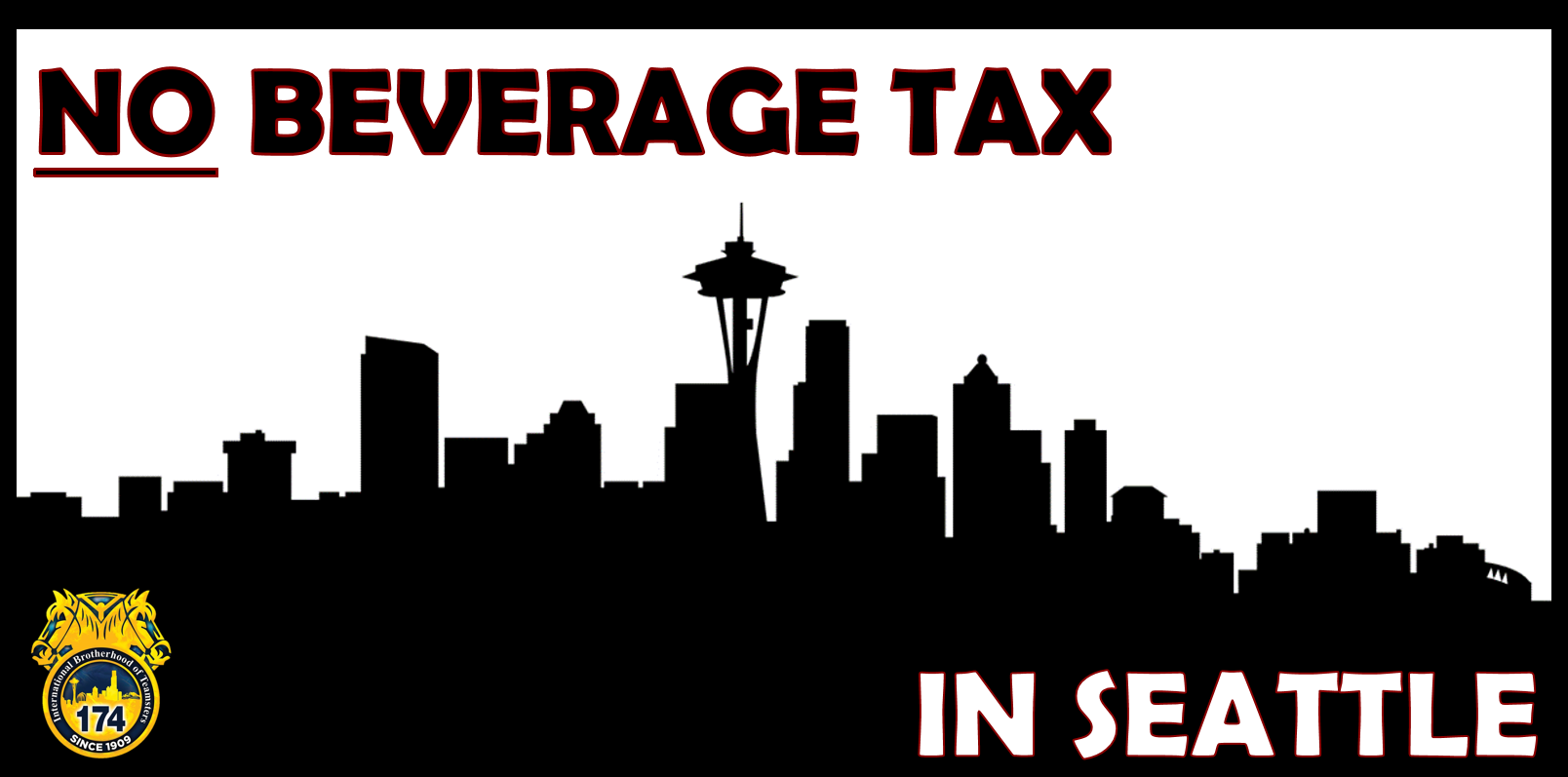[precontent]

[/precontent]
March 29, 2017
On February 21, 2017, Seattle Mayor Ed Murray proposed a tax on sugary beverages for the City of Seattle. This tax, which would affect sodas, sports drinks, energy drinks, pre-sweetened teas, coffees, and some fruit drinks, has already been implemented in several other major cities in the United States.
One of the most recent cities to adopt this type of tax is Philadelphia, where a 1.5 cent-per-ounce tax on sugar-sweetened and diet beverages went into effect on January 1, 2017.
The effects of this tax have been disastrous for the Beverage industry in Philadelphia. According to the Principal Officer of Teamsters Local 830, Danny Grace, the effects have been:
- Beverage companies as a whole have seen their sales decrease between 40%-54%
- Pepsi Philadelphia has announced a first round of layoffs of between 80-100 employees. Teamster commissioned salespersons for Pepsi have seen their weekly take home pay decrease between 50% to 70% due to lost sales in the market
- Coca-Cola has initiated layoffs of approximately 30% of its work force in Philadelphia
- Canada Dry/7-UP and Dr. Pepper has initiated layoffs of 35 Employees
The tax proposed by Seattle Mayor Ed Murray would be $.02 per ounce, which is approximately 33.5% higher than the tax that went into effect in Philadelphia.
“The impacts of such a tax in Seattle will be devastating to the hundreds of Teamster members that are employed in the Beverage industry,” said Teamsters Local 174 Secretary-Treasurer Rick Hicks. “And the impact wouldn’t stop there. This tax will have negative impacts on both Union and non-represented employees throughout the Beverage, Grocery, and Food Service industries as well. We cannot and do not support a tax that will put hardworking middle-class Americans out of a job, no matter how well-intentioned the tax may be.”
Learn more about the tax’s impact in Philadelphia, as well as the proposed tax in Seattle, by reading the articles below:
[divider]
PepsiCo Pulls Soft Drinks From Philadelphia Stores Over Soda Tax
March 27, 2017 — by Kristen Cloud
PepsiCo is pulling its 2-liter and 12-pack products from Philadelphia grocery store shelves, citing the city’s new tax on sweetened beverages as the reason.
Philly grocery stores reportedly received letters from PepsiCo recently saying the company would no longer distribute the sizes to the city’s stores. The decision affects brands like Pepsi, Mountain Dew, Sierra Mist, Mug root beer, Gatorade, Tropicana and Lipton Iced Tea drinks. PepsiCo’s full portfolio in all package sizes is available outside the city.
Earlier this month, PepsiCo said the beverage tax was resulting in its laying off 80 to 100 workers at area distribution plants.
The Philadelphia City Council approved the 1.5-cents-per-ounce tax on sugar-sweetened and diet beverages by a 13-4 vote last year, making Philadelphia the first major U.S. city to enact such a tax. The city began collecting the tax on Jan. 1, 2017.
[divider]
Seattle mayor proposes tax on sugary drinks to help fund education
February 21, 2017 — q13fox.com — by Janet Kim
SEATTLE — Mayor Ed Murray is proposing a sugary drink tax, something that’s been done in other major cities. It includes sodas, energy and sports drinks, pre-sweetened teas and coffees and even some fruit drinks.
The ordinance exempts such beverages as 100% fruit juice, in-store prepared coffee beverages, infant formula, medicine, and would NOT apply to “diet” beverages.
This proposed ordinance would put a 2-cent tax per ounce on distributors. Distributors say it will likely trickle down to consumers.
The money is to help fund education, but not everyone is on board with the plan. George O’Connor, the owner of Ken’s Market in Queen Anne in Seattle, believes the tax will hurt small businesses like his and also hurt consumers.
“I’m kind of annoyed,” said O’Connor. “More tax and more tax — when’s it going to stop?”
The mayor says the tax would fund education and help eliminate the opportunity gap between affluent and poor students — all while fighting the obesity epidemic by reducing consumption of sugary drinks.
Parents like Brecken Diller support it.
“I think it’s a good thing,” said Diller. “We don’t drink soda. We’ve got two boys, and I know the tax. The proceeds of it are going to education. My wife is a school teacher, and so I think it’s actually a really good thing.”
The proposed tax is expected to raise $16 million per year to fund programs recommended by the Education Summit Advisory Group.
Last year, three cities in California, along with Boulder, Colorado, voted to pass a soda tax measure. They joined Berkeley and Philadelphia, who passed something similar in 2014. However, in 2010, former New York City Mayor Michael Bloomberg aggressively tried to pass a tax but failed.
According to The New York Times, researchers at Berkeley studied people in that city, along with San Francisco and Oakland. Four months after the tax went into place, the amount of people drinking sugary drinks did fall by 21 percent, but only in Berkeley. In the other two cities, it went up 4 percent.
